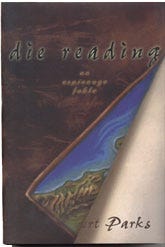Die Reading: An Espionage Fable By Joey Robert Parks

The book, Die Reading: An Espionage Fable by Joey Robert Parks, has quite an original synopsis. (I first heard about it in a book made for book lovers called, 1001 Books You Must Read Before You Die, which is also worth the read and made me very interested in trying to get a chance to read this book since my library didn't carry it. I eventually decided to buy it.) This is Parks first work of fiction, but he is known as a professional ghostwriter, editor, and fiction author. He resides in Arizona and makes his living there. (The copy I had acquired was signed with a phone number inside, oddly enough. Whilst I did email the author, our correspondence left the lack of explanation in regards to why there would be so many errors in his book, that is, if he did read all of my original review, since I suggested he might be interested in adding himself to Goodreads, and also liked my review.) Despite this though, the story is quite captivating if all the repetitious sentence editing issues and minor grammatical errors don't get in the way of the ride.
This story is about a teenage boy, Simon who notices a young woman who we discover to be a tourist in a bookstore, she also happening to love coffee; I learned more about espresso than I did working at my local coffee shop. Rebecca knows everything about it, since she's a poet moonlighting as a coffee barista; but this is only one part of an extremely complicated story. She possesses an exceedingly special cup. This cup is what drives the story and complicates her and Simon's (among others) lives. Now, there are many reasons which would drive one to want to read this book. It's one of a kind; I've never heard of a story with a theme like this before. Not only is it part love story, but it also has action, adventure and more than a few mysteries. It's quite an original concept; but, there are some plot-devices which were off-putting and, for me, ended a little too quickly. There were many errors and some continuity issues at the beginning of the book. (It wasn't as noticeable towards the middle and end, but it still left me wanting those issues fixed in order to have a more satisfying outcome due to their repetitiousness.)
The way Parks begins the story is this, the main characters are introduced in the beginning, the reader learning their back stories a bit, and then becoming immersed into a diary, written by a man who had the cup before Rebecca and was using it for selfish reasons; Which is where the espionage comes in. (After an enormously interesting start, I found the diary part of the book, which is most of the middle, on the lengthy side. I realize it has to be there to set up the rest of the story, but I wish it might have been more broken up so the reader could learn what was happening during the present, as well.) Without giving too much away, this story definitely tries to cover all its bases, but the action seemed to lack that exuberance that one finds with a flowing fight scene and still seemed to lack an adequate ending; I was left feeling like there was something I was missing. It does wrap everything up by the end, but not enough to give that fulfilling feeling one gets with a completed story. (On the other hand, the book did accomplish to draw me into a tremendously occupying and semi-futuristic reality.) A cup that can show the person holding it the past and future if the person who has it knows how to use it, they being able to record moments and then to play them back later, all depending on the liquid put inside the cup.
This might be the fault of the editors or whoever was in charge of changing the book so it flows more smoothly, but unfortunately, it didn't seem to stick. (I'm not sure if this is because the copy I bought was a numbered edition before it was officially published. I hope so, only so I know it may have all been fixed before the final copies were published) or this is the final draft that went out into the world. Either way, I truly hope a 2nd edition is in this book's future so those problems can be addressed. Other than those few exceptions to a perfectly bold start in a rare subject, I believe this story takes quite an exciting view into an idea which deserves to acquire a following. I'd love to read more books in this genre and hope there's more to come, if not from this author, than hopefully others.)
